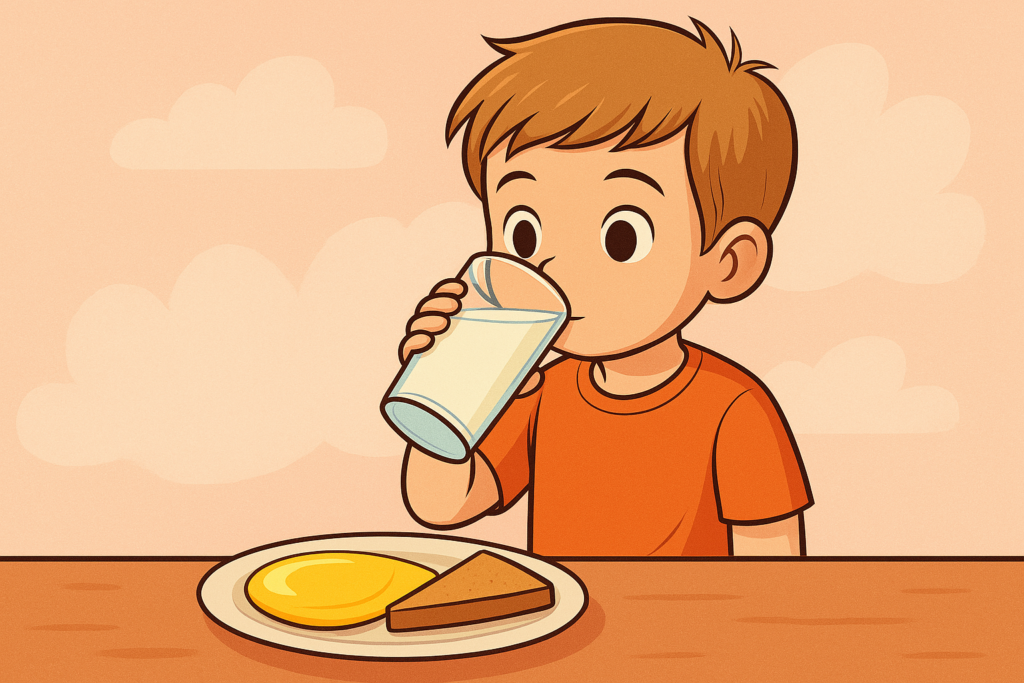We’ve all heard it — “Give your child a glass of milk first thing in the morning. It’s healthy!” But is empty stomach milk really the best way to start the day? Surprisingly, there’s more to this than just calcium and tradition.
If your child begins their day with a glass of milk on an empty stomach, it could have both benefits and drawbacks. Let’s break it down with a warm cup of facts, recent science, and a little parenting reality.
The Traditional Thinking: Milk For Kids = Power Boost
For generations, milk has been seen as the perfect food — rich in protein, calcium, vitamin D, and essential fats. Starting the day with milk was meant to:
- Strengthen bones
- Support growth
- Provide lasting energy
- Keep hunger at bay
And honestly, none of that is wrong. Milk for kids is nutritious. But like everything in nutrition, context matters — especially when we’re talking about what happens when it’s the first thing in the stomach.
What Science Is Now Saying About milk for kids
Recent studies are looking deeper into how our digestive system responds to different foods at different times of the day. Here’s what researchers and pediatric nutritionists are starting to observe:
1. Milk Can Be Heavy on the Tummy
Milk contains casein protein, which takes time to digest. On an empty stomach, especially in younger kids, this can cause:
- Bloating
- Mild nausea
- Reduced appetite for breakfast
- Even reflux in sensitive children
Recent Insight: A study published in Pediatric Gastroenterology (2023) suggested that children who drank milk on an empty stomach tended to eat 25% less of their breakfast — reducing their overall nutrient intake for the morning.
2. Lactose on Empty Can Trigger Sensitivities
If your child is slightly lactose intolerant (many are, unknowingly!), having milk first thing can irritate their gut:
- Cramping
- Gas
- Loose motions later in the day
This is because milk stimulates gastric acid production, and with no food to buffer it, it may cause discomfort or digestion issues.
The Psychological Side — A Real Parent Concern
Kids are routine-driven. When they associate milk with “done for breakfast,” they might skip actual solid food. This creates a habit loop where:
- They don’t get fiber or complex carbs
- Energy crashes by mid-morning
- Mood swings or sluggishness increase
Unique Insight: Experts now suggest that liquid calories (like milk or juice) shouldn’t replace a meal in growing kids, especially in the first half of the day when the brain and body demand sustained fuel.

When milk works best (Photo : Vcurehealthcare.com)
When Milk For Kids Works Best
Don’t worry — this doesn’t mean milk is off the table. It just means we need to time it better.
Here’s how to give milk more effectively:
- After a small bite: Pair it with a banana, oats, or toast — something to line the stomach.
- Mid-morning snack: Between breakfast and lunch is often ideal.
- Bedtime: Warm milk can promote better sleep due to tryptophan, a natural calming amino acid.
Surprising Facts Most People Don’t Know
- Milk isn’t hydrating: Starting the day with water (not milk) helps activate digestion and detoxification.
- Iron absorption can be blocked: Milk contains calcium, which competes with iron for absorption. If your child takes iron supplements or iron-rich foods, don’t pair them with milk.
- Early dairy exposure and acne? Emerging evidence shows a potential link between excess dairy intake and hormonal fluctuations, especially in teens.
Final Word: What Should You Do?
Giving milk isn’t bad — but timing and pairing matter. Here’s a great morning routine:
Start with water (warm or room temp)
Offer a balanced breakfast (fruit + whole grain + protein)
Serve milk mid-morning or as a side, not the star
Takeaway
Milk is powerful, but not magical. It’s a part of a child’s diet — not the whole story. Let your child eat first, hydrate, and then sip their way to strong bones.
References
- Pediatric Gastroenterology Study – 2023
- Harvard T.H. Chan School of Public Health – Milk and Health
- National Institutes of Health – Lactose Intolerance
- Indian Pediatrics Journal – Milk Consumption and Appetite in Preschoolers
Read About : Why Your Child Screams at Night – The Shocking Truth!
Visit Our Doctors At : https://g.co/kgs/rTqAjgt





